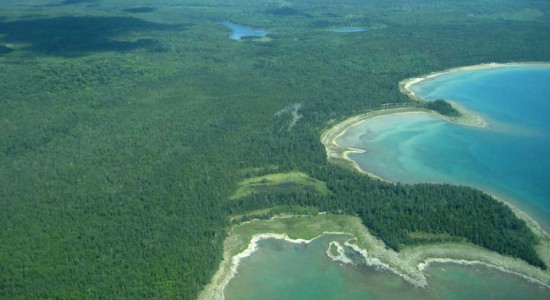The Nature Conservancy of Canada is eager to purchase a massive plot of pristine island land from a timber company, but first it will need to finish raising CAD $15.2 million.
Cockburn Island is a true rarity in Ontario’s celebrated “Cottage Country” – a vast and virtually untouched wilderness that offers a glimpse of Canada’s remote past, showing Lake Huron’s natural glory before it was filled with the sailboats and Jet Skis of countless weekend visitors. The island is notable for both its unspoiled nature and its size; only a tiny amount of development can be found on its 170 square kilometres, and with only one permanent resident, the island is part of the least-inhabited municipality in Canada.
According to the Nature Conservancy of Canada (NCC), however, it’s a race against time to save Cockburn Island from fast-encroaching development. The island, found to the west of popular holiday spot Manitoulin Island, is gaining attention from cottage developers and rock quarry firms, which could threaten its abundant wildlife and important wetland sanctuaries. Out of 32,000 Great Lakes islands studied, Cockburn Island was ranked in the top ten for conservation importance, and a mere 1% of the island is currently protected from commercial use.
James Duncan, Nature Conservancy of Canada Regional Vice President for Ontario, said in a recent press release that time was of the essence in acquiring the property, which is almost 60% of the huge island. “The Cockburn Island project will conserve one tree for every Ontarian,” he said. “The window of opportunity to conserve this large a project in southern Ontario is open now. If NCC cannot mobilize the resources to conserve this beautiful piece of Canada, it will likely be carved up, sold off, and developed.”
While more than $15 million may sound like a steep price for the NCC to pay, the reality is that environmentally-sensitive lands in a pristine state are getting more difficult to find, and relative to the size of the property, it can be seen as an excellent value for the money. One anonymous donor was quoted as saying that a recent conservation project they were involved with cost $22 million for a mere 100 acres, and that the chance to conserve more than 24,000 acres was an once-in-a-lifetime opportunity.
The NCC’s impassioned pleas to protect Cockburn Island have not gone unheeded – private donations thus far account for more than $10 million of the $15.2 million required to buy the land. While large donors have made a big impact so far, Mr. Duncan remarked that every Ontarian, regardless of their ability, could play an important role in conserving Cockburn Island. “Every dollar counts: if just half of Ontarians gave $1 each,” he said, “we would have the remaining $5 million needed for this project.”
Visit the website for the Nature Conservancy of Canada: Link




